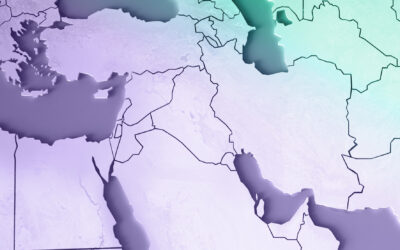April 1, 2024
By Daniel Silverberg and Elena McGovern, co-heads of Capstone’s National Security Practice
Immigration is a white-hot electoral issue in the United States. The mere threat of increased immigration stemming from humanitarian crises in Haiti, Venezuela, and Africa presents a confluence of underappreciated, under-the-radar implications. They pose the most significant risks for President Joe Biden, as former President Trump seeks to appeal to minority voters who are increasingly concerned over how President Biden has handled immigration. Here, we delve into developments in Haiti, Venezuela, and Africa and their implications for the upcoming election.
Political Collapse in Haiti Drives Immigration Fears, Electoral Fodder
Increasing violence in Haiti, which is perennially teetering on collapse, could impact US electoral dynamics. Gangs now control Haiti’s already fragile government and infrastructure, and there are concerns of mass hunger, violence, and disease amidst gang violence proliferating throughout the capital. Sexual violence has become pervasive and is going unpunished. The US started airlifting citizens out of the country last week, and the head of UNICEF, Catherine Russell, described the fighting as “a scene out of Mad Max.”
For President Biden, this is both a foreign policy and political challenge. GOP leaders are predicting “mass migration of aliens” as a result of the crisis in Haiti. Florida’s Governor, Ron DeSantis, deployed 250 National Guardsmen as a preemptive measure earlier this month, and Florida’s Senate delegation penned a letter to President Biden decrying Biden’s potential “opening the floodgates for countless, unvetted foreign nationals.” It is unclear whether a mass migration crisis will materialize due to the chaos. Coast Guard and Customs and Border Protection officials have not yet reported increased migration from Haiti, and, according to a Department of Homeland Security spokesperson this week, “irregular migration flows through the Caribbean remain low.”
Haiti’s collapse presents political peril for President Biden, as does the possibility of a broader regional crisis.
Nevertheless, Haiti’s collapse presents political peril for President Biden, as does the possibility of a broader regional crisis, and thus commands the highest levels of attention from Biden’s national security team. For former President Trump, whose campaign benefits from placing immigration front and center, these crises present a clear political card to play.
The Likely Reimposition of Sanctions, Continued Emigration Flows, and Hard Questions for Biden’s Venezuela Policy
Capstone has been following US-Venezuela dynamics in recent months, as the prospects of “snap back” sanctions on Venezuela are increasingly likely—with significant investment implications for the energy sector. The Biden administration issued a six-month sanctions waiver in October 2023 as part of an effort to incentivize Venezuela’s ruling junta to allow for free elections and release political prisoners. That plan appears increasingly dubious, with Venezuelan leader Nicolas Maduro jailing opposition candidates, and making it increasingly likely the Biden administration will reimpose sanctions after the end of the six-months on April 18. Venezuelan migration to the US, including both legally and illegally, has been growing in recent years as conditions deteriorate on the ground there. The reimposition of sanctions could incentivize further emigration out of the country and into the United States. Observers already claim there will be a surge of migration to the US, potentially with criminals.
The next couple of months in Venezuela could compound the real and political risks presented by the crisis in Haiti. In a vacuum, Biden’s political calculus probably went something like this: he was likely willing to gamble on a sanctions deal with Maduro because, politically, he had little to lose given that Florida is increasingly less winnable for Biden and because there are few congressional seats for Democrats to protect in southern Florida, where voters punish engagement with dictators like Maduro or Cuba’s Castro. However, with immigration now being a national issue, as opposed to one more contained in border regions and those with large immigrant populations, the risks to a general election are larger. Put together with the crisis in Haiti, the very real migration challenge, and the political fallout, things are beginning to look much worse for the Biden administration.
African Instability Also Driving Migrants to the US
Migrants fleeing more distant conflicts are also coming to Central and South America, looking for access to the US. Coups have rattled Niger, Mali, Gabon, Burkina Faso, Sudan, Guinea, and Chad in recent years. The UN Secretary-General decried an “epidemic of coups” in Africa, and the chaos has exacerbated an already challenging immigration flow, predominantly to Europe’s shores but also increasingly across the Atlantic. According to the New York Times, Africans detained at the US southern border grew from 13,406 in 2022 to 58,462—a 336% increase year-over-year. Europe has tried to stop migration via detention programs in Libya and other means, but the situation is worsening. Last week alone, 60 migrants drowned after launching from Libya, while a mass grave of migrants was discovered there.
The momentum of migration shows no sign of slowing—and the more they appear seeking asylum in the US, the greater the political pressure.
The political reverberations in Europe are also increasingly being reflected in the US. Over the last decade, several European governments have nearly fallen over the issue of migration, and, as a result, leaders like Italy’s Prime Minister Giorgia Meloni are hyper-focused on improving conditions in West Africa to slow migration. The Biden administration is joining this effort and pursuing projects with the Europeans, particularly with the Biden administration, investing in Africa in myriad ways to improve livelihoods. However, the momentum of migration shows no sign of slowing—and the more they appear seeking asylum in the US, the greater the political pressure. Pressure compounds politically as reporting continues to suggest that many of these migrants are first arriving in Central America with the intent of entering the US illegally.
Haiti, Venezuela, and Africa do not capture headlines the way wars in Ukraine or the Middle East do. However, investors and companies should pay attention to developments in these battle-scarred countries to appreciate how some of these foreign policy considerations will feed into meaningful electoral dynamics that could, in turn, impact the outcome of the US presidential election in November.

Daniel Silverberg, co-head of Capstone’s National Security Practice

Elena McGovern, co-head of Capstone’s National Security Practice
Read more from Capstone’s National Security Practice:
The Five Fronts of Conflict in the Middle East
Five Underappreciated Near-Term Foreign Policy Developments
The Strategic Shift: Why US-China Policy Will Shift to More Subtle Posturing



























